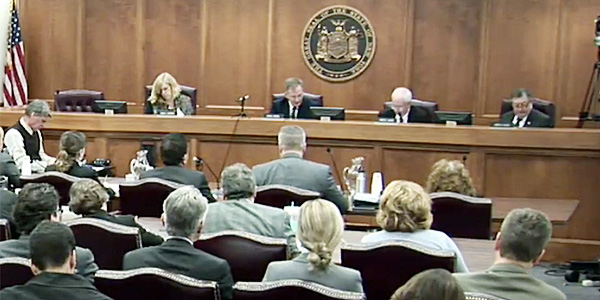By Michael Kuser
The New York Public Service Commission on Thursday unanimously approved renewing Westchester County’s community choice aggregation (CCA) program, which since 2016 has pooled municipalities to purchase electricity and natural gas in bulk.
The county’s Sustainable Westchester is the only active CCA in the state so far (Case 14-M-0564), though the PSC has approved three others. CCAs also provide consumers increased access to distributed energy resources and efficiency programs and products.
Commissioner Diane Burman supported the order but asked Department of Public Service staff about low-income provisions in the programs.
Ted Kelly, DPS assistant counsel, said, “As with the other CCA programs, Sustainable Westchester can only serve low-income customers with the start of the new, renewed program if they offer and provide those customers with a guaranteed savings product, and they did discuss that in their master implementation plan and acknowledge that they were aware of and would comply with that requirement.”
Commissioner Gregg Sayre said that CCAs are consistent with “increased customer choice and a market-based encouragement of new options for clean energy and distributed energy resources.”
Home EV Charging Tariff Nixed; Revisions Ordered
The PSC rejected tariff filings for residential electric vehicle charging from all the major investor-owned utilities in the state (Case No. 18-E-0206) and ordered them to file revisions that implement time-of-use (TOU) rates equal to the traditional residential customer charge.
“The incremental customer charge associated with TOU rates can deter EV customers from adopting the TOU tariff and can impact a customer’s decision as to whether to purchase an EV,” the commission said. “Minimizing such costs will lower barriers for customers to adopt TOU rates.”
“We know electric vehicles are coming, and we know that it’s up to us to make sure that this coming call on the electric system is managed well,” PSC Chair John Rhodes said. “That in turn calls for good engineering, but also for good economics and, specifically, good rates.”
Mary Ann Sorrentino, acting DPS chief of electric rates and tariffs, testified that the relevant statute (PBS Section 66-o) was intended to provide incentives to buy EVs and encourage the adoption of grid-responsible charging times.
New York law requires utilities to file residential EV charging tariffs and to report periodically, but the commission’s Nov. 15 order defines the reporting as annual and directs Central Hudson Gas & Electric, New York State Electric & Gas, Rochester Gas and Electric, Consolidated Edison and Niagara Mohawk Power to file their annual report every Jan. 30, starting in 2019.
“The tariffs addressing 66-o are essentially similar in that each of the electric utilities proposed a one-year price guarantee for residential customers with qualifying EVs that go on the residential time-of-use rate for their entire load,” Sorrentino said.
Under TOU rates, charges are lower during off-peak hours. The commission has already approved price guarantees for EV owners in Con Ed and Orange and Rockland Utilities service territories to reduce customers’ fear of trying a new rate, she said.
“The PSC has a broader proceeding underway to develop its approach to EVs comprehensively [Case 18-E-0138], but in the meantime, this is a smart, pragmatic adaptation of existing approaches that fits with our principles and makes sense,” Rhodes said.
The commission’s order on residential charging rates “complements the broader proceeding” on EV infrastructure and also the proceeding on the value of distributed energy resources (Case 15-E-0751), Sorrentino said.
Thursday’s order also addresses utilities with residential TOU rates that contain incremental meter charges as opposed to increased customer charges, such as National Grid and RG&E, directing that “residential customers with qualifying registered EVs that take service under residential TOU rates shall not be subject to the incremental charge.”
The commission in September approved Con Ed expanding its EV charging program, SmartCharge NY, to offer incentives to customers who charge medium- and heavy-duty EVs during off-peak hours. The commission’s order (Case 16-E-0060) said “it is critical to begin testing the efficacy of off-peak charging programs for the full gamut of EVs at a time when EV penetration is comparatively low.”
New York’s zero-emissions vehicle plan calls for creating statewide EV infrastructure to support 30,000 to 40,000 EV sales by the end of 2018 and 10,000 charging stations by 2021. The commission in September reported 26,470 EVs registered in New York.









